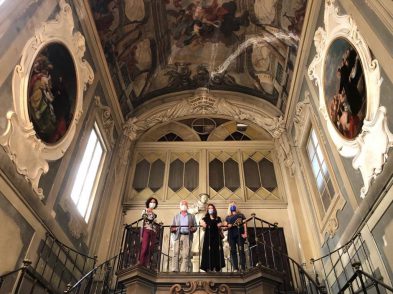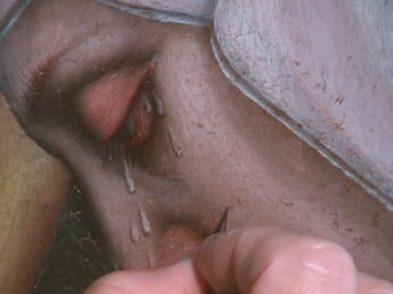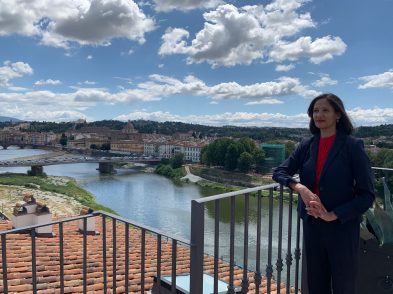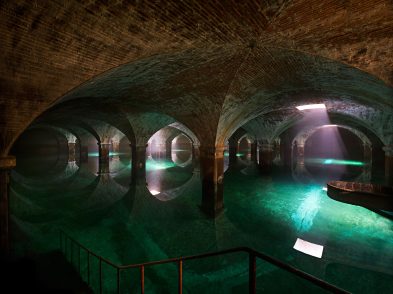I’d been recently hired by a Tuscan regional association whose goal was to provide youth services and career training to young Italians who wanted to become more desirable candidates for the international job market. During a workshop on writing resumes my student, Claudio, raised his hand to adamantly proclaim the uselessness of the lesson.
“This is a waste of time,” he protested, “because none of us are going to get the job we want anyway. It’s an impossible thing.”
Unsure of how to react to his outburst, I tried to make light of his comment. “Well, you can always use a scrap of your resume to stop the table leg from wobbling,” I told him.
He smiled, and the lesson went on virtually unharmed, but suddenly my heart wasn’t in it. When the workshop finally ended, I went to talk to Domenico. When I am plagued by that feeling of futility that teachers are often known to experience, he’s the person I most like to see. Not that he ever tries to make me see the bright side of things. Remember, Domenico is from Puglia where fatalism is a way of life. He listens patiently first, and then proceeds to artfully wrap my worries in a thousand long-winded theories until I forget what my original dilemma was. Our visits usually solve my chronic cultural distress quite nicely, and I go away comforted. There is nothing as reassuring as someone telling you that you’re being an idiot when you really are being one.
“Domenico,” I complained, “these students in my class are twenty-six years old and most have never had a paying job before. Half of them are apprenticing in law offices or architectural firms for free. It’s degrading. When I asked them what their professional goals were, most just went on and on about how difficult it is to work in Italy. They seemed so resigned and dreamless.”
Domenico thought a minute and I waited. Whatever it was he wanted to tell me, he usually took the scenic route to get there. “Well,” he said, “It used to be that to live well in Italy you needed just three things: furbizia, fortuna, e fegato, cunning, luck, and liver. Young Italians have the first two, but are miserably lacking in the last.”
“They lack liver?” I queried, not realising that he meant to say they had no guts.
“Yes. Our generation was born with no courage at all. We are not risk takers because we have known too much comfort. Besides, we have no use for fegato. In Italy, there are no more new horizons. Everything has been done. That’s why you used the word ‘dreamless.’ Every inch of creativity has already been claimed.”
My friend’s comment left me surprised and silent. “Was that true?” I wondered. Had the peninsula, home to more artists, saints, and adventurers than any other part of the world, suddenly become a sterile country? Modern architects certainly had a hard time, I knew. After all, new buildings easily become eyesores when crunched between the Roman and the Gothic. And it’s well known that innovation is not the key word in many Italian cities, where people need official permission to paint their shutters any colour other than olive green. New artists, I’ve also been told, find it hard to produce when the whole world is still feeding off the wonders of Michelangelo. And scientists? Did we know any graduates, Domenico demanded, who had been awarded research grants in Italy? No. All had been forced to find support abroad.
“In Italy the young have become pessimistic,” Domenico continued. “Maybe in America people feel their pioneer past. There’s still the idea that you can go west, put up a stake, and claim new land. Americans put up a flag and claimed the moon. In Italy, it’s not that way. Here, everything has been discovered. And what hasn’t been discovered had best stay underground.”
“What do you mean?” I asked.
“Try to build a house here. As soon as you start digging, you unearth Etruscan ruins. So you have to stop construction to preserve history.”
I sighed. He had so many words, and I had so few. “You’re not making me feel better,” I said.
“Nor did I have that intention,” my friend grinned. “You know, the difference between you and me is the way we look at a tree. You find all this depressing because Americans value far-reaching branches. Italians don’t. We prefer far-reaching roots.”
That’s what I liked about Dome-nico. He made you wait an hour and a half, but, in the end, he was always able to summarise cultural identity in twenty-five words or less. It was a talent, however, I couldn’t afford to give him credit for. Act impressed by Domenico’s axioms and it’s the end of you.
“You should have been a filosofo,” I tell him, with all the indifference I can feign.
“Of course,” he grinned. “If you don’t have fegato, you need filosofia.”
There it was again. Life in a nutshell.







